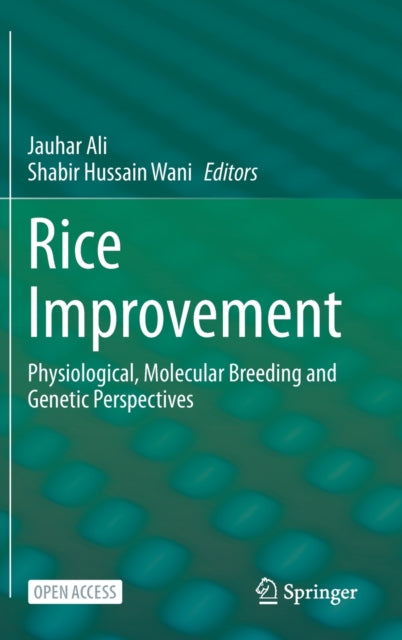Shulph Ink
Rice Improvement: Physiological, Molecular Breeding and Genetic Perspectives
Rice Improvement: Physiological, Molecular Breeding and Genetic Perspectives
YOU SAVE £7.52
- Condition: Brand new
- UK Delivery times: Usually arrives within 2 - 3 working days
- UK Shipping: Fee starts at £2.39. Subject to product weight & dimension
Bulk ordering. Want 15 or more copies? Get a personalised quote and bigger discounts. Learn more about bulk orders.
Couldn't load pickup availability
- More about Rice Improvement: Physiological, Molecular Breeding and Genetic Perspectives
The human population is expected to reach 9.7 billion by 2050, and the demand for increased food production needs to be met from ever reducing resources of land, water, and other environmental constraints. Rice remains the staple food source for a majority of the global populations, but climate change imposes abiotic and biotic stresses that curtail rice quality and yields. The 'green super rice breeding strategy' has been successful in developing and releasing multiple abiotic and biotic stress tolerant rice varieties. Recent advances in plant molecular biology and biotechnologies have led to the identification of stress responsive genes and signaling pathways, which open up new paradigms to augment rice productivity. Transcription factors, protein kinases, and enzymes for generating protective metabolites and proteins all contribute to an intricate network of events that guard and maintain cellular integrity. Quantitative trait loci associated with elevated stress tolerance have been cloned, resulting in the detection of novel genes for biotic and abiotic stress resistance. Mechanistic understanding of the genetic basis of traits, such as N and P use, is allowing rice researchers to engineer nutrient-efficient rice varieties, which would result in higher yields with lower inputs. Third generation sequencing techniques are on the horizon, allowing for exciting progress to improve molecular markers for gene-trait associations.
Format: Hardback
Length: 498 pages
Publication date: 06 May 2021
Publisher: Springer Nature Switzerland AG
The human population is projected to reach 9.7 billion by 2050, presenting a significant challenge in meeting the growing demand for food production. The limited resources of land, water, and other environmental constraints further exacerbate this issue. While rice remains a staple food source, particularly in Asia, where ninety percent of rice is grown and consumed, climate change continues to impose abiotic and biotic stresses that negatively impact rice quality and yields. Researchers have been diligently working to develop innovative solutions to maintain or even increase rice production. One such strategy is the 'green super rice breeding strategy,' which has successfully led to the development and release of multiple abiotic and biotic stress-tolerant rice varieties.
Recent advancements in plant molecular biology and biotechnologies have provided valuable insights into stress-responsive genes and signaling pathways, offering new avenues to augment rice productivity. Transcription factors, protein kinases, and enzymes involved in the generation of protective metabolites and proteins play crucial roles in safeguarding cellular integrity. Furthermore, the identification of quantitative trait loci associated with elevated stress tolerance has led to the cloning of novel genes for biotic and abiotic stress resistance.
Mechanistic understanding of the genetic basis of traits, such as nitrogen (N) and phosphorus (P) use, enables rice researchers to engineer nutrient-efficient rice varieties that yield higher yields with reduced inputs. Additionally, research in micronutrient biosynthesis opens up possibilities for genetic engineering of metabolic pathways to enhance micronutrient production.
Third-generation sequencing techniques have revolutionized the field of rice genetics, providing unprecedented opportunities for detailed analysis of gene expression and genetic diversity. These techniques have facilitated the identification of novel genes and regulatory networks involved in stress response, nutrient utilization, and other important agronomic traits.
In conclusion, the challenges posed by the growing human population and the impact of climate change on rice production require innovative solutions. The 'green super rice breeding strategy' and advancements in plant molecular biology and biotechnologies offer promising avenues to maintain and increase rice production. By understanding the genetic basis of traits and utilizing cutting-edge technologies, researchers can engineer nutrient-efficient rice varieties and enhance micronutrient production, ultimately contributing to food security and sustainable agriculture.
Weight: 934g
Dimension: 235 x 155 (mm)
ISBN-13: 9783030665296
Edition number: 1st ed. 2021
This item can be found in:
UK and International shipping information
UK and International shipping information
UK Delivery and returns information:
- Delivery within 2 - 3 days when ordering in the UK.
- Shipping fee for UK customers from £2.39. Fully tracked shipping service available.
- Returns policy: Return within 30 days of receipt for full refund.
International deliveries:
Shulph Ink now ships to Australia, Belgium, Canada, France, Germany, Ireland, Italy, India, Luxembourg Saudi Arabia, Singapore, Spain, Netherlands, New Zealand, United Arab Emirates, United States of America.
- Delivery times: within 5 - 10 days for international orders.
- Shipping fee: charges vary for overseas orders. Only tracked services are available for most international orders. Some countries have untracked shipping options.
- Customs charges: If ordering to addresses outside the United Kingdom, you may or may not incur additional customs and duties fees during local delivery.


